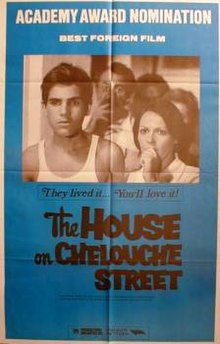The House on Chelouche Street
| The House on Chelouche Street | |
|---|---|
 Film poster | |
| Directed by | Moshé Mizrahi |
| Written by | Rachel Fabien Yerech Guber Moshé Mizrahi |
| Produced by | Yoram Globus (executive producer) Menahem Golan (producer) |
| Starring | Gila Almagor |
| Cinematography | Adam Greenberg |
| Edited by | Dov Hoenig |
| Music by | Dov Seltzer |
Release date |
|
Running time | 110 minutes |
| Country | Israel |
| Languages | Hebrew Egyptian Arabic Ladino |
The House on Chelouche Street (Hebrew: הבית ברחוב שלוש, romanized: HaBayit b'Rechov Shalosh) is a 1973 semi-autobiographical film by Israeli director Moshé Mizrahi, who also co-wrote the screenplay. It was filmed in Hebrew, Egyptian Arabic and Judeo-Spanish (a.k.a. Ladino, a Jewish language mostly derived from Old Castilian). The film was nominated for the Academy Award for Best Foreign Language Film.[1]
Plot
[edit]The film tells the story of a Sephardi family of Egyptian Jewish immigrants from Alexandria that settle in 1947 Tel Aviv. The family consists of a 33-year-old widowed wife, Clara, (played by Gila Almagor, one of the most prominent actresses in Israel for the last three decades) and her four children. They live in a working-class neighborhood surrounded by their extended family, including Clara's mother Mazal, Clara's uncle Rafael, and Sultana, his wife.
The plot centers on the firstborn, Sami, his transition from a shy 15-year-old to a working man and an activist in the "Irgun" (a resistance movement that acted mainly against the military forces of the British), and the romantic attachment he develops with a 25-year-old Russian immigrant librarian (Michal Bat-Adam, now a director). In addition to this, Clara struggles between social pressure to take a husband and her own complex feelings surrounding this, complicated by another Sephardi Egyptian, played by Yosef Shiloach, who has strong feelings for her.
The film is a vivid and very credible description of the lives of Sephardi immigrant families on the eve of the declaration of the state of Israel. Also covered are the escalating violence between British forces and the local populace, as well as Palestinian Arab violence towards Jews.
Cast
[edit]- Gila Almagor as Clara
- Ofer Shalhin as Sami
- Michal Bat-Adam as Sonia
- Yosef Shiloach as Nissim
- Avner Hizkiyahu as Rafael
- Rolf Brin as Grossman
- Eti Grotas as Sultana
- Bronka Salzman as Mazal
See also
[edit]- List of submissions to the 46th Academy Awards for Best Foreign Language Film
- List of Israeli submissions for the Academy Award for Best Foreign Language Film
References
[edit]- ^ "The 46th Academy Awards (1974) Nominees and Winners". oscars.org. Retrieved 3 December 2011.
External links
[edit]- 1973 films
- 1970s Hebrew-language films
- Judaeo-Spanish-language films
- Films about immigration
- Biographical films about Jewish people
- Films directed by Moshé Mizrahi
- Films set in 1947
- Films set in Tel Aviv
- 1973 drama films
- Israeli multilingual films
- 1973 multilingual films
- Israeli drama films
- Golan-Globus films
- Films produced by Menahem Golan
- Films scored by Dov Seltzer
- Semi-autobiographical films
- Israeli film stubs
- 1970s drama film stubs
